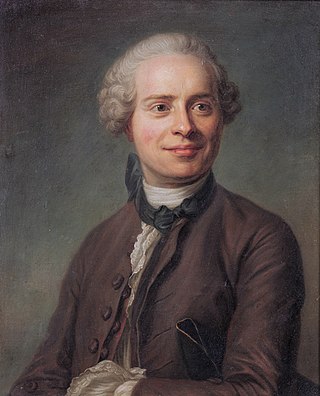Related Research Articles

Baron Augustin-Louis Cauchy was a French mathematician, engineer, and physicist. He was one of the first to rigorously state and prove the key theorems of calculus, pioneered the field complex analysis, and the study of permutation groups in abstract algebra. Cauchy also contributed to a number of topics in mathematical physics, notably continuum mechanics.

Baron Siméon Denis Poisson FRS FRSE was a French mathematician and physicist who worked on statistics, complex analysis, partial differential equations, the calculus of variations, analytical mechanics, electricity and magnetism, thermodynamics, elasticity, and fluid mechanics. Moreover, he predicted the Arago spot in his attempt to disprove the wave theory of Augustin-Jean Fresnel.

Adrien-Marie Legendre was a French mathematician who made numerous contributions to mathematics. Well-known and important concepts such as the Legendre polynomials and Legendre transformation are named after him. He is also known for his contributions to the method of least squares, and was the first to officially publish on it, though Carl Friedrich Gauss had discovered it before him.

Jean-Baptiste le Rond d'Alembert was a French mathematician, mechanician, physicist, philosopher, and music theorist. Until 1759 he was, together with Denis Diderot, a co-editor of the Encyclopédie. D'Alembert's formula for obtaining solutions to the wave equation is named after him. The wave equation is sometimes referred to as d'Alembert's equation, and the fundamental theorem of algebra is named after d'Alembert in French.

Joseph-Louis Lagrange, also reported as Giuseppe Luigi Lagrange or Lagrangia, was an Italian mathematician, physicist and astronomer, later naturalized French. He made significant contributions to the fields of analysis, number theory, and both classical and celestial mechanics.
The year 1829 in science and technology involved some significant events, listed below.
The year 1837 in science and technology involved some significant events, listed below.
The year 1835 in science and technology involved some significant events, listed below.
The year 1811 in science and technology involved some significant events, listed below.
The year 1771 in science and technology involved some significant events.
The year 1796 in science and technology involved some significant events.
The year 1746 in science and technology involved some significant events.
The year 1797 in science and technology involved some significant events.
The year 1774 in science and technology involved some significant events.
The year 1736 in science and technology involved some significant events.
In mathematics, the Lagrange reversion theorem gives series or formal power series expansions of certain implicitly defined functions; indeed, of compositions with such functions.

Giovanni Antonio Amedeo Plana was an Italian astronomer and mathematician. He is considered one of the premiere Italian scientists of his age.

Victor de Riqueti, Marquis de Mirabeau was a French economist of the Physiocratic school. He was the father of Honoré, Comte de Mirabeau and André Boniface Louis Riqueti de Mirabeau. He was, in distinction, often referred to as the elder Mirabeau as he had a younger brother, Jean-Antoine Riqueti de Mirabeau (1717–1794).

Jean-Baptiste Joseph Fourier was a French mathematician and physicist born in Auxerre and best known for initiating the investigation of Fourier series, which eventually developed into Fourier analysis and harmonic analysis, and their applications to problems of heat transfer and vibrations. The Fourier transform and Fourier's law of conduction are also named in his honour. Fourier is also generally credited with the discovery of the greenhouse effect.

Louis Isaac de Beausobre was a German philosopher and political economist of French Huguenot descent. He was born in Berlin, the son of the French Protestant churchman and ecclesiastical historian Isaac de Beausobre and his second wife, Charlotte Schwarz. He is not to be confused with his elder half-brother, the pastor and theologian Charles Louis de Beausobre (1690–1753).
References
- ↑ "Today & History". Equitable Life. 2009-06-26. Archived from the original on 2009-06-29. Retrieved 2010-10-20.
- ↑ In his 1762 paper on sound, Lagrange treats a special case of the theorem: Lagrange (1762) "Nouvelles recherches sur la nature et la propagation du son" (New researches on the nature and propagation of sound), Miscellanea Taurinensia (also known as: Mélanges de Turin ), 2: 11-172. This article is reprinted as: "Nouvelles recherches sur la nature et la propagation du son" in: Serret, J. A., ed., Oeuvres de Lagrange (Paris: Gauthier-Villars, 1867), 1: 151-316; on pp. 263-265, Lagrange transforms triple integrals into double integrals using integration by parts.
- ↑ Anderson, R. G. W. (2004). "Black, Joseph (1728–1799)" . Oxford Dictionary of National Biography (Online ed.). Oxford University Press. doi:10.1093/ref:odnb/2495 . Retrieved 2016-02-01.(Subscription or UK public library membership required.)
- ↑ "Copley Medal | British scientific award". Encyclopedia Britannica. Retrieved 21 July 2020.
- ↑ O'Connor, John J.; Robertson, Edmund F. (November 1999). "William Braikenridge". MacTutor History of Mathematics . Archived from the original on 2019-08-27. Retrieved 2012-01-24.